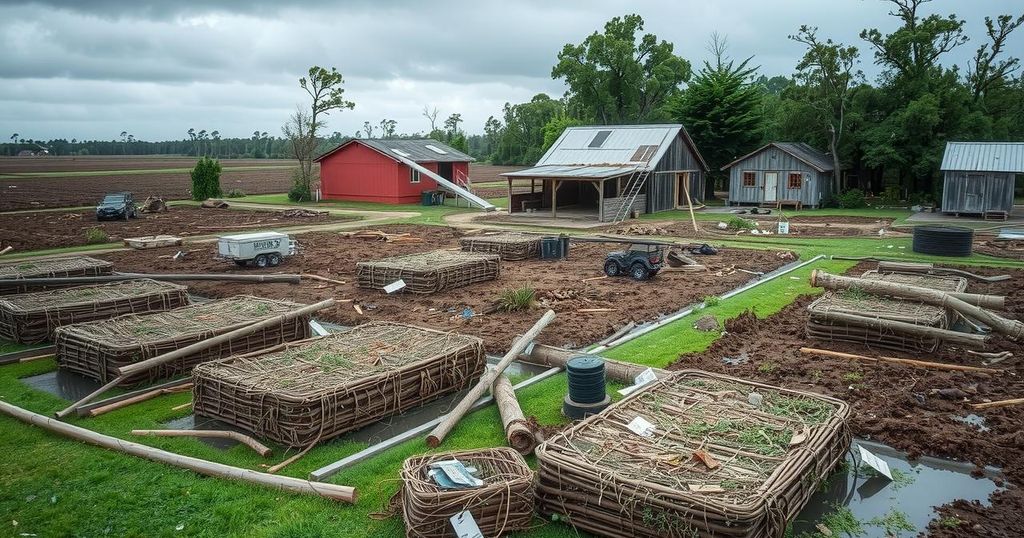Hurricane Helene Devastates Southern Farmers Beyond Recovery

Months after Hurricane Helene’s landfall, Southern U.S. farmers, notably in Georgia, are enduring significant losses. The storm caused over $10 billion in damages, affecting various crops and infrastructure at a critical harvest time. Farmers like Chris Hopkins and Jeffrey Pridgen are facing not only financial losses but emotional challenges as they navigate the rebuilding process with limited immediate assistance due to state law restrictions.
Farmers across the Southern United States continue to grapple with the aftermath of Hurricane Helene, which struck the region in late September. Over two months subsequent to the storm’s devastation, Chris Hopkins, a farmer in Toombs County, Georgia, describes the extensive damage to his farm, where twisted equipment and broken tree limbs remain scattered. Facing the emotional and financial toll of the disaster, he contemplates whether to rebuild or abandon the farming business altogether.
The hurricane made landfall as a Category 4 storm and prompted significant destruction to crops and agricultural infrastructure, with experts estimating losses exceeding $10 billion. In Georgia alone, cotton growers experienced severe impacts just as the harvest was beginning, resulting in substantial crop losses, including an estimated 50% loss of harvest for Hopkins.
Moreover, the broader agricultural community suffered extensive damages, with economic analyses indicating losses of $630 million in Virginia, $452 million in South Carolina, and $162 million in Florida. Such figures reflect the storm’s widespread impact on various agricultural sectors including cotton, poultry, and timber. As Hopkins articulates the situation, “We were at the most vulnerable stage we could be… About 50% of the harvestable lint ended up on the ground.”
The state of Georgia allocated $100 million to support farmers and clean up efforts in the wake of Hurricane Helene. However, restrictions within the state constitution limit direct disaster aid to individuals and private enterprises. Meanwhile, federal support is being discussed to provide a relief package to affected farmers, highlighting the urgent need for assistance expressed by farmers like Jeffrey Pridgen, whose poultry business suffered considerable losses.
Experts also noted that while Hurricane Helene inflicted significant damage, consumer prices for many agricultural products are unlikely to see drastic increases, except potentially for pecans, where Georgia accounts for a substantial share of U.S. production.
Overall, the consequences of Hurricane Helene have left a profound impact on farmers, some of whom may not fully recover for years. Industry leaders emphasize the necessity of rebuilding while acknowledging that many farmers have lost everything due to the storm.
In September 2024, Hurricane Helene made landfall in Florida, subsequently causing widespread destruction as it moved northward through the Southeastern United States, particularly affecting farming communities in Georgia, South Carolina, and Virginia. The storm, which resulted in extensive crop damage, upended livelihoods by destroying key infrastructure and agricultural products. As the dust settles from the abrupt devastation, farmers find themselves in an emotionally taxing and financially precarious situation, dealing with immediate recoveries alongside long-term rebuilding efforts.
Hurricane Helene has had a devastating impact on the agricultural landscape of the Southeast, with farmers grappling with both emotional and financial strains in its aftermath. As they begin to assess the extensive damages and the long process of recovery necessitated by this natural disaster, state and federal support remains critical for their survival. Policymakers and agricultural leaders are urged to expedite assistance to enable farmers to rebuild and ultimately continue contributing to the region’s agricultural economy.
Original Source: mynorthwest.com








